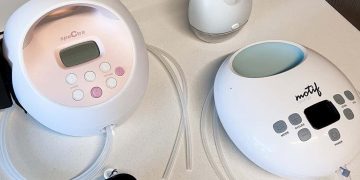Right away I was able to jump back into deep breathing and continue to work on my contractions. When my midwife told me I was 6 cm dilated, I was shocked! I had barely reached 3.5 cm with my first delivery before requesting the epidural, so hearing that I was over halfway to 10 cm gave me such a confidence boost. Well, I could do it.
Can you get an epidural at a birthing center? After revealing that Julian’s birth was unmedicated, I was overwhelmed by this question. A: No. At least not where I was born. Many of you may be wondering why I or anyone would want to give birth without the option of pain relief, especially considering that I had success with it during my first birth.
There were a few different reasons why I became interested in giving birth without medication.
The main reason was that I wanted to give birth outside of a traditional hospital setting and be cared for by professionals whose first goal was to get me to have an intervention-free birth. From the moment I saw the birthing center’s labor and delivery room, I was sold. The room was very quiet and home-like and really made me excited about my birth. Non-medicated births are the livelihood of the birth center midwives and nurses, and from the beginning I felt like everyone was “on my team” and that I would be fully supported in my birth plan.
In the hospital, there is really no way to know what you are going to experience in advance. Were the on-call OBs and nurses supportive of a non-medicated birth? Would I be forced to lie on my back? Will I be forced to receive Pitocin, other interventions, etc. if they feel I’m not progressing fast enough? Will there even be a room where I can work in the tub or shower? Will I be able to eat real food? I could list many other common hospital birth practices and scenarios that I know I don’t want to encounter in this birth.
As a second time mom, I also felt more confident in myself because I knew that my body had already delivered once and that statistically I would have a much faster labor. The other reason was that I wanted to recover quickly.
I will say that we arrived at the birthing center around 10:30 p.m. and for the next 5 hours I worked through contractions with the help of Nick and my doula, Anna. To keep things running smoothly, Anna had me change positions every 30 minutes or so. I would walk from the birthing tub to the bed, kneel on the bed, and lean my belly on this big triangular pillow. I also found sitting on the toilet incredibly relaxing and a great place to breathe through contractions haha.
One of the things that surprised me was that I was somehow able to really relax and even fall asleep between contractions. Before giving birth, I listened to a lot of podcasts and positive birth stories where moms who had unmedicated births mentioned that with the right deep breathing and relaxation techniques, they were actually able to fall asleep during the later stages of labor. This sounded crazy to me, and I didn’t think I could do it because 1) I was completely powerless over pain, and 2) I’m a very anxious person by nature. But it happened! Nick told me that I had over 15 minutes to doze off between contractions when I was over 8 cm dilated, and he and Anna were like, wait, how is she sleeping now?
My contractions continued to increase in intensity, eventually reaching the point where I really only had a minute or so to rest. Having Anna there to apply counter pressure to my hips and back was everything. Regardless of which type of birth you plan to have, I highly recommend hiring a guide if possible. I didn’t have one for my first birth, but I wish I had because 1) they can act as your voice and make sure your birth plan is followed, and 2) they are experts at supporting mom and dad during labor. Overall, Anna added a sense of calm to my birth experience. She was there throughout my birth to make sure all my needs were met and to provide helpful advice (she did attend hundreds of births.) She also served as Nick’s guide/mentor, making sure he was involved and felt included.
After a few hours of trying, I remember feeling like time was passing slowly and even a little frustrated that I wasn’t progressing faster. I asked one of my midwives why things weren’t happening faster, especially because I was a second time mom and had it in my head that labor would be quick, and she said to me, “I know you feel like it’s all going slow, but I promise you it’s going much faster than you think and you are making amazing progress.”
From then on, I tried to put the idea of time out of my mind and just kept telling myself that each contraction was one step closer to my baby. They continued to increase in intensity, eventually reaching the point where I literally only had a minute or so to rest. By then I had become completely primal – moaning low, crouching on all fours, and I didn’t care who saw that I was basically naked. Indeed, during birth, all your inhibitions disappear. I was a very modest person – aka the girl who changed in the bathroom stall at the gym because God forbid anyone should see my underwear. At birth? Get those clothes off of me.
One of the things I did to prepare for an unmedicated birth was the transition phase, but what ended up happening was much different. This stage of labor is when you progress from 8-10 cm dilated, just before pushing. The transition phase is usually very pronounced and intense, but also very short (less than 30 minutes). Strangely enough, I never noticed any difference between my active labor and the transition period. There was never a moment when I felt a sharp jump in contraction pain – they just continued to intensify.
Then things got real. My water finally broke at 10 cm and things went 0-100. the calm demeanor and deep breathing I had been able to maintain during active labor and transition completely disappeared. I stayed on my knees in bed with my chest resting on a large triangular pillow, but my sensations were so intense that Nick had to climb into bed in front of me and physically support me as I pushed.
I’m not going to lie. The contraction “pain” I felt earlier was insignificant compared to the ring of fire. It was the only time since J was born that I felt scared and that things might be out of my control. I must have screamed a few lines that you might expect to hear in a movie. I also somehow ended up putting Nick in a choking situation, haha. For dear life, I almost clung to him.
In total I pushed for about half an hour, and I would say the ring of fire lasted about 5-10 minutes. During the pushing, I was sure I was in tears because that’s exactly what it felt like. Thankfully, that was not the case. Afterwards my midwife told me that I had a small cosmetic tear internally and that my perineum was intact. Big sigh of relief. During the pushing process, she and the nurses kept using hot packs and coconut oil “down there” to protect me and help stretch my skin. I remember asking the OB at my hospital birth if they could do something similar and almost being laughed off by the OB. I am so grateful that this time I had a care team that prioritized this without me even having to ask.















































